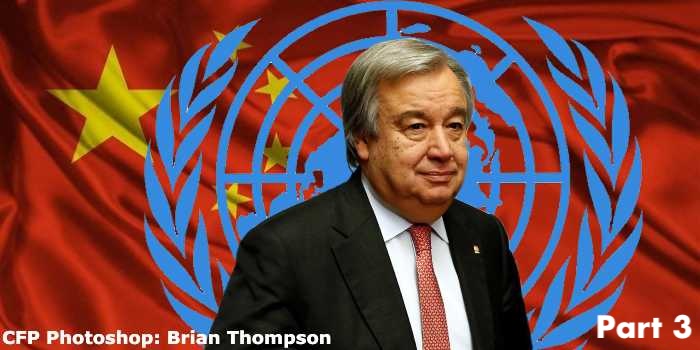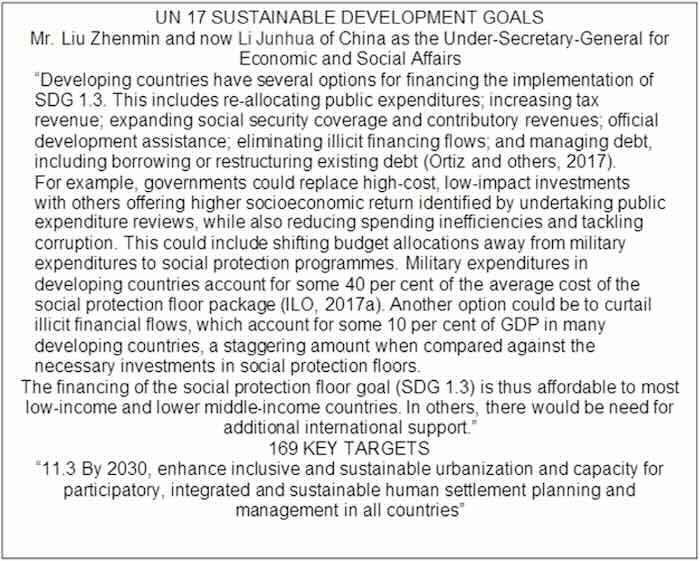By Elizabeth Marshall ——Bio and Archives--January 25, 2024
World News | CFP Comments | Reader Friendly | Subscribe | Email Us

In the early 1990’s the United Nations decided to expand on its mandate and, to some, this entity has created an over-arching mandate of interfering in the world’s sovereign Nations. This mandate consists of encouraging various Nations, non-profit organizations, non-governmental organizations, some post-secondary institutions, etc., to bring forward unsustainable platforms, to the detriment of various citizens.
In June of 1992, at the United Nations Conference on Environment & Development, in Rio de Janeiro, “AGENDA 21, The United Nations Sustainable Development Agenda” was brought to life. It included a Declaration “on Environment and Development, and the Statement of principles for the Sustainable Management of Forests.” This declaration was adopted by some 178 countries in attendance at the Conference[1] This was the beginning of the economic, social and environmental issues the “member states,” of the UN, are confronting, today.
Series:
BREAK DOWN: The U.N., ICLEI & The China Solution Part 1
BREAK DOWN: The U.N., ICLEI & The China Solution Part 2
BREAK DOWN: The U.N., ICLEI & The China Solution Part 3
BREAK DOWN: The U.N., ICLEI & The China Solution Part 4
BREAK DOWN: The U.N., ICLEI & The China Solution Part 5
BREAK DOWN: The U.N., ICLEI & The China Solution Part 6

Since 1992 we have seen, on numerous occasions, violations of the global human rights, all in the name of this Agenda. Through this Agenda, various governments, intent on the removal of their citizen’s rights, have been given the ability to say this is all for the sake of man-kind and/or the common good.[2] After all who would think that the UN would do anything to violate human rights, let alone create mandates, that would harm the various sovereign nations, particularly by means of the environment and climate change.
“The Commission on Sustainable Development (CSD) was created in December 1992 to ensure effective follow-up of UNCED, to monitor and report on implementation of the agreements at the local, national, regional and international levels. It was agreed that a five year review of Earth Summit progress would be made in 1997 by the United Nations General Assembly meeting in special session.”[3]
This isn’t the first time the UN has seen the effects of 5 year plans.[4] In 1946-47 the UN initiated a mission, to the Ukraine/Russia, to investigate why Russian society was the way it was and why Russia was turning its back on the Western democracies it had been allied with during WWII. Those Five Year Plans involved similar removal of rights including the fundamental human right of survival. As expressed:
“There is no pretense, of course, of government by the people, nor any real understanding of what it means. The Communist regards “the non-party masses” as a herd of lazy, slow-witted, bearlike creatures, benumbed by centuries of serfdom, who have to be coaxed and chivvied along the road to The Perfect Society by the Party shepherds. The common man cannot be trusted to decide what is good for him, because he would almost surely want nothing more than a full belly, warm clothes, and a long nap on top of the brick stove. Certainly he is not farsighted enough to choose the bone-cracking labor and the endless self-denial which are demanded by the new series of Five Year Plans.
Public policy, therefore, must be left in the hands of the elite, who are specially trained to deal with such matters. The people are permitted to vote, because voting is one of the traditional trimmings of “democracy.”[5]
And while the UN and its affiliates have stated the Sustainable Development Goals (SDG) are voluntary, what nation is going to be bullied and vilified, on the world stage, by not being in agreement, and/or implementing these unsustainable goals. One merely has to look at the present 17 UN SDGs (Agenda 2030), and the contradictions involved in those goals, to realize this seems to have very little to do with the protection of the environment or the changing climate and more to do with control executed by the signatories of the agreement and/or China’s prosperity through the UN.
In Canada we have the Federation of Canadian Municipalities and its “Green Municipal Fund” Five Year Plan[6] which may show how deeply these failed SDGs have reached into Canadian governance and society.
On the forefront, in Canada, is the use of the carbon taxes used to subject Canadians to financial hardship and an attempt to stop Canadians from using fossil fuels. This is laid out in the UN Sustainable Development reports. [7] People are having to decide whether to eat or heat and, it would seem, based on political push-back, the sitting government has had to carve out, at least one heat source, as their numbers are decreasing in the polls.[8] This does nothing for the survival of people using other heat sources and one merely has to look at the statements above to see this is the reality of many people – is this not a violation of basic human rights, particularly in the Northern Hemisphere? It seems the UN is the proxy for human rights violations and not some sovereign nations, doesn’t it?
To be continued in Part 4 of BREAK DOWN: The U.N., ICLEI & The China Solution…
[1] Sustainable Development Outcome Documents-Agenda21
[2] Responding to the call for a Rescue Plan for People and Planet
Introduction
by Li Junhua, Under-Secretary-General for Economic and Social Affairs
Over the course of the 77th session of the General Assembly, the world continued to suffer significant setbacks in terms of development progress, triggered by inter-related shocks – the COVID-19 pandemic, conflicts in many regions including the war in Ukraine, a cost-of-living crisis and debt distress in many parts of world, in addition to longer-term threats and challenges such as climate change, biodiversity loss, and demographic change. Against this backdrop, UN DESA’s work continued to address the 10 priority action areas committed to by Member States at the SDG Summit in 2019, while also responding to the Secretary-General’s vision outlined in Our Common Agenda to turbocharge action on the SDG progress. The Department also looked ahead to supported Member States in preparing for the SDG Summit in September 2023, as well as the Summit of the Future in 2024.
UN DESA Annual Highlights Report 2022-2023
“Global environmental commons – Expanding protected areas, abandoning intensive agricultural practices in protected areas, ambitious reforestation of all degraded forest areas, shifting societal preferences towards conservation land use, reducing water consumption and ensuring environmental flow requirements, and adopting a 1.5o C land-sector road map that combines ambitious protection, conservation, restoration and lifestyle changes.” TIMES OF CRISIS, TIMES OF CHANGE: SCIENCE FOR ACCELERATING TRANSFORMATIONS TO SUSTAINABLE DEVELOPMENT, p. 23.
[3] Sustainable Development Outcome Documents-Agenda21
[4] “Just how bad this news was did not dawn on the Russians until March 15, 1946, when government announced the details for the first of its new Five Year Plans. This document outlined a truly backbreaking task.” “Why They Behave Like Russians” by John Fischer, p. 36.
[5] “Why They Behave Like Russians” by John Fischer, p. 76.
[6] Federation of Canadian Municipalities: Green Municipal Fund (2018-2023)
[7] “An effective green recovery package should also include levying or increasing carbon taxes and winding down fossil fuel subsidies, allowing the market price to provide signals that encourage sustainable consumption and investment. The historically low oil price — a result of collapsed demand in the midst of the pandemic — has made introducing a carbon tax and phasing out fossil fuel subsidies more palatable to the public, thereby entailing less political cost. It can be shown that even a substantial carbon tax of $54 per metric ton of CO2 — a level that falls within the estimated range required to meet the Paris Agreement — would only lead to an increase of less than 50 cents per gallon for gasoline in the United States, which would still keep the gasoline prices at very low levels.” UN Sustainable Development (Goals) Outlook 2020, Chapter II. Achieving prosperity in the wake of COVID-19 p. 23.
[8] Ottawa exempting home heating oil from carbon tax for 3 years, Trudeau says
View Comments
• Elizabeth Marshall on Facebook
• Non-Partisan Advocate
• Director of Research Ontario Landowners Association
• Author – “Property Rights 101: An Introduction”
• Board Member/Secretary – Canadian Justice Review Board
• Legal Research – Green and Associates Law Offices, etc.,
• Legislative Researcher – MPs, MPPs, Municipal Councilors,
• President All Rights Research Ltd.,
I am not a lawyer and do not give legal advice. Any information relayed is for informational purposes only. Please contact a lawyer.